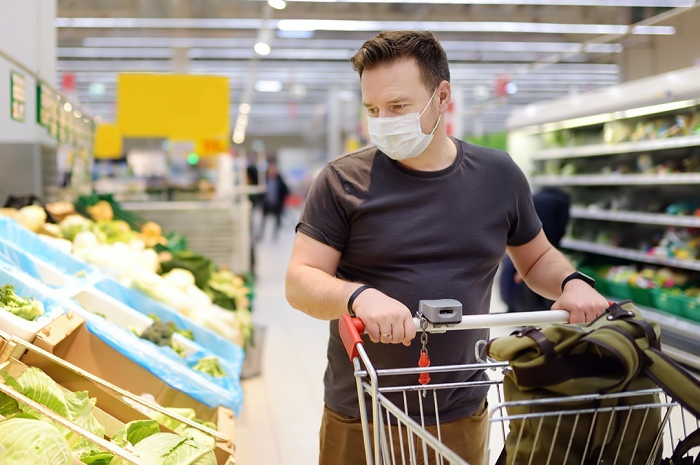The health crisis that is the COVID-19 pandemic has well and truly turned our world upside down. To prevent the virus from spreading, governments all over the world have been enforcing lockdowns and quarantines, advising people to stay indoors for their own safety. Usually busy offices are deserted; telecommuting has become the new norm for many working professionals. All non-essential businesses are closed, too.
In the time of corona, the arduous task of resupplying our fridges and cupboards have largely fallen to our capable, able-bodied menfolk. To ensure that proper social distancing is observed at grocery stores and supermarkets, men have bravely volunteered themselves. Unfortunately, most of them have been sent out into the world unawares. Unfamiliar with the lay of the land, they return to us with bags full of curiosities—or missing essential items.
Perplexed partners and hapless husbands, this guide is for you. Come home to nothing less than a hero’s welcome with these tips for a safe, successful grocery run:
Bring a grocery list.
A grocery list is useful. With it, you’ll lessen your chances of missing anything essential, thus minimizing the frequency of your shopping trips. You’ll also be able to get in and out of the supermarket faster.
However, it’s not enough to simply take the grocery list that your wife or girlfriend has made and head off to the store. Read it. Make sure you understand every item on the list and don’t be afraid to ask for clarification or specifics before leaving the house. If the list says rice, ask her how much rice. Is there a preferred brand or type of rice? You’d be surprised at just how many kinds of rice (and flour, and oil) there can be on a single shelf. By asking ahead of time, you prevent yourself from picking up the wrong product. There’s no shame in being thorough.
Gear up.
Face masks are essential and non-negotiable. Some stores won’t even let you in without one. The jury’s out about wearing gloves at the moment: some news articles say that it’s a good idea, while others claim that it isn’t very protective. What we do know for sure is that the virus can survive on plastic and stainless steel for 2 to 3 days, 24 hours on cardboard, and 4 hours on copper. You’ll at least want to bring something to disinfect your shopping cart or basket with, like disinfectant wipes. You’ll also want to keep your hands clean, so bring some sanitizer along, too. Take care not to touch your eyes, nose, or mouth while out.
Most supermarkets are running with skeleton crews, so expect a long wait at the register. Ease the discomfort of standing for extended periods by wearing Burlix standing-over-the-calf socks, which can enhance circulation through graduated compression. A compact foldable stool can also be convenient in these situations, or you can simply make use of the self-checkout lane if your store has one.
Wear comfortable clothing and shoes suitable for walking. There’s no need to get a hazmat suit out; just wear something you can freely move around in.
Time your visit strategically.
Before corona, one had to go in the early morning or late at night to beat the crowds at the supermarket. Now that several major stores have cut their hours short, it’s much harder to tell when the peak times are.
According to recent data analytics from Retail Aware, the best times to shop are Wednesdays and Thursdays before 10 in the morning. Weekends are still the busiest times for supermarkets, so avoid heading out on a Saturday or Sunday if you can.
Steer clear of others.
You’re most likely to get the virus from someone else; the chances of contracting it from touching things or food in the store is relatively low. For this reason, the CDC recommends maintaining at least six feet of clearance between yourself and another person at all times. Avoid crowded aisles and just move on to the next item on your list. You can always circle back for what you need later after the people disperse.
Go contactless.
Cash is just another surface that the virus can live on. Contactless payment options are the solution—you touch fewer things when you use Apple Pay, Google Pay, or tap-to-pay terminals. If your store isn’t equipped with these payment methods, make sure that you sanitize your hands after paying for your purchases. Do not touch anything else before doing so.
Employing a bit of common sense can’t hurt during these trying times. If you are sick or elderly, do not go to the grocery store. The same goes for those who suffer from chronic health conditions, as well as immune-compromised individuals. Consider looking into delivery options instead or enlisting the help of a good friend or neighbor. Stay safe—and wash your hands!


Comments are closed.